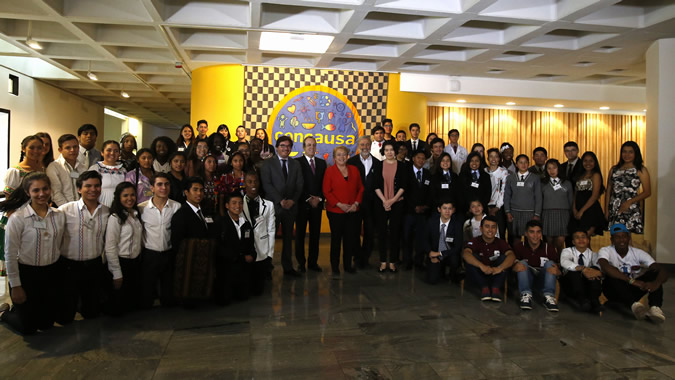Press Release
Young people from eleven Latin American and Caribbean countries presented their proposals for meeting the 2030 Agenda and its 17 Sustainable Development Goals and for overcoming child poverty, in a seminar held at the Economic Commission for Latin America and the Caribbean (ECLAC) headquarters in Santiago, Chile.
The seminar was opened by Chilean President Michelle Bachelet; ECLAC’s Deputy Executive Secretary for Management and Programme Analysis, Raúl García-Buchaca; the Representative for the Chilean Office of the United Nations International Children’s Emergency Fund (UNICEF), Hai Kyung Jun; and the Executive President of América Solidaria, Benito Baranda. Chile’s Minister of Social Development, Marco Barraza, also attended.
A pre-recorded message from ELCAC’s Executive Secretary, Alicia Bárcena, was transmitted to attendees prior to the opening. Bárcena was unable to attend due to unavoidable commitments.
Chile’s Deputy Secretary of Social Evaluation, Heidi Berner, and ECLAC’s Social Development Division Chief, Laís Abramo, participated in the closing ceremony.
The seminar took place within the framework of the Concausa initiative organized by América Solidaria, ECLAC and UNICEF, and seeks to identify and spread word of projects aimed at ending child poverty in the region and meeting the 2030 Agenda for Sustainable Development.
In her speech, President Michelle Bachelet stated that in the countries of Latin America and the Caribbean, “we continue to bear the burden of not having ended poverty, inequality and discrimination. We also take the brunt of the impact of our past decisions on the environment and on progress in our territories.”
In front of the 54 young people present, the President called for “combining actions to mobilize more and more desire for a common horizon: sustainable development, the kind that leaves no one behind, that respects the wealth and fragility of our planet.”
ECLAC’s Executive Secretary, Alicia Bárcena, affirmed in her recorded message that the region had shown concrete progress in the past decade towards reducing child poverty. However, 41% of boys and girls are still living in poverty in the region, and of those, 16.7% in extreme poverty.
The United Nations high official added that, with the implementation of the SDGs already underway, “the participation and appropriation of the 2030 Agenda by young people is a means and an end in itself. Indeed, the voices, actions and solutions of young people, as well as their scope and will to influence decision-making, are essential to achieving long-term social development.”
Raúl García-Buchaca, meanwhile, underscored that, as suggested by ECLAC in documents presented at its recent session, inequality is a concept that transcends access to income and its distribution; it also includes the opportunities available to people and the full enjoyment of their rights.
“Our region, and the entire world, only advances when rights are guaranteed and with the inclusion of all members,” he emphasized.
Hai Kyung Jun stressed that “young people represent more than a quarter of the entire world population, and therefore hold immense potential to benefit their societies socially, politically and economically.”
“They will tell us how they have worked to end child poverty in their areas, and how they are taking ownership of the 2030 Agenda through their own experiences. From UNICEF, I can tell you that we still have a ways to go on the path to defend children’s rights, and to achieve real, lasting changes in the lives of boys, girls and adolescents in our region. Our goal is to ensure everyone’s right to survive, prosper and reach their potential in their surroundings,” she affirmed.
Benito Baranda pointed out that, “in this second edition of Concausa, we have borne witness to the strength, conviction and humanity of these young students who have come from all corners of the Americas to dream and strive for a different continent than the one we have created.”
He added, “They have brought their realities, their riches, their needs and their efforts to change these realities, and this is why we invite them to dialogue, not to compete for the best social project, but rather to jointly build a better place for everyone.”
In the second edition of Concausa, there were 341 projects by young people, aged 15-17, from eleven countries in the region. Of all the participants, the Concausa judges selected 18 projects designed and implemented by young people from Argentina, Chile, Colombia, Costa Rica, Ecuador, Guatemala, Haiti, Mexico, Paraguay, Peru and Uruguay.
The 54 young people on the teams selected won the chance to travel to Santiago, Chile to participate in a week of educational activities to learn in depth about the 2030 Agenda and its 17 Sustainable Development Goals.
The week got underway on Saturday, November 25 with the Concausa Festival, with participation by 20 social organizations involved in sustainable development and the overcoming of child poverty, and ended yesterday with the seminar at ECLAC.



